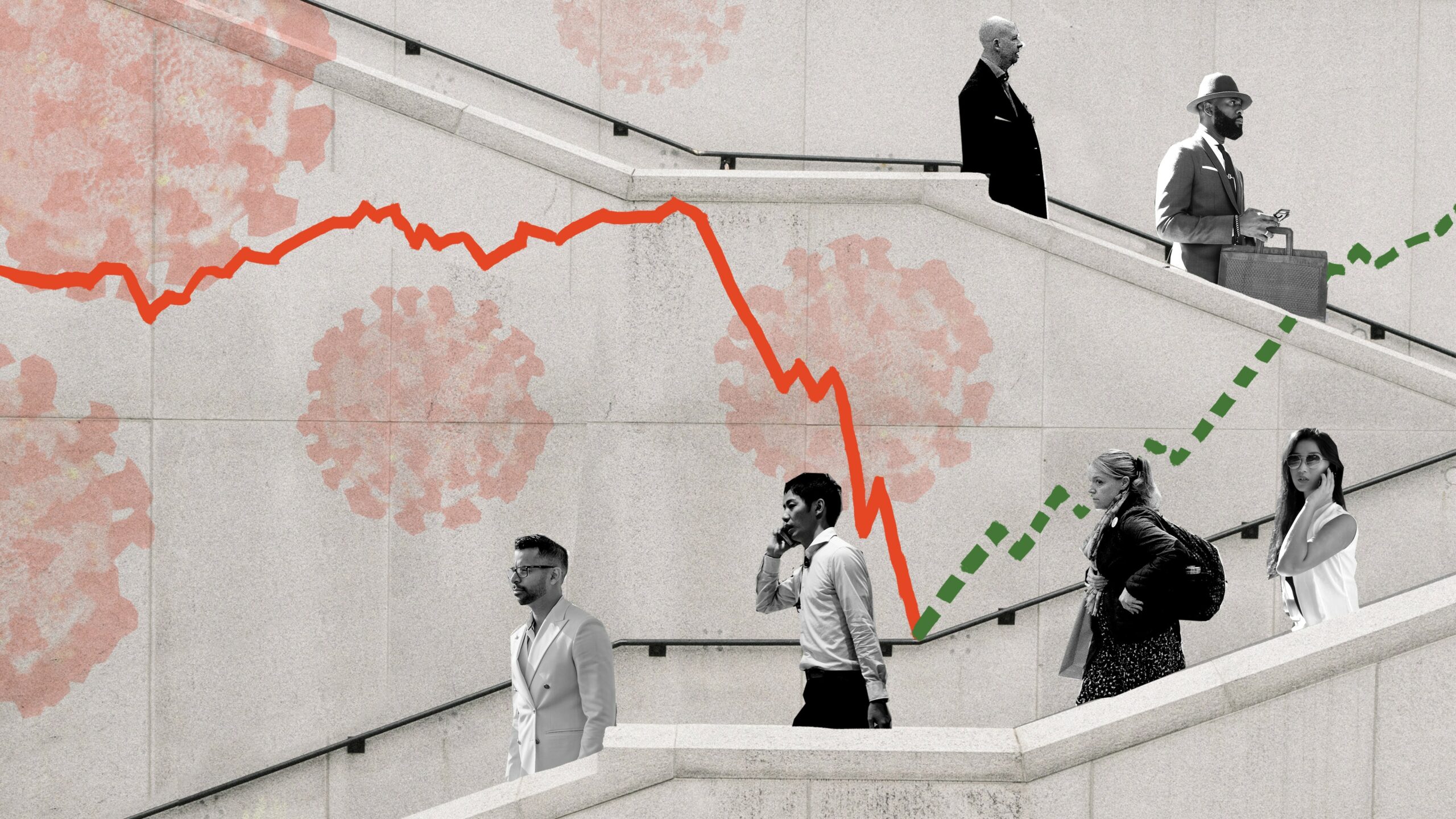Sandra Peter and Kai Riemer

Gig work changes and worker protests on Corona Business Insights
As some gig workers become essential workers others face long term unemployment. Gig workers are striking, walking off the job and protesting among changing labour circumstances.
As COVID-19 sets out to change the world forever, join Sandra Peter and Kai Riemer as they think about what’s to come in the future of business.
Shownotes
COVID-19 aggravates disputes around gig work
This episode is part of a podcast series covering what COVID-19 will mean for the business world, where we look at the impact on the economy, businesses, industries, workers and society. This is part of our ongoing coverage of the impact of COVID-19 on the future of business.
Follow the show on Apple Podcasts, Spotify, Overcast, Google Podcasts, Pocket Casts or wherever you get your podcasts. You can follow Sydney Business Insights on Flipboard, LinkedIn, Twitter and WeChat to keep updated with our latest insights.
Send us your news ideas to sbi@sydney.edu.au.
Dr Sandra Peter is the Director of Sydney Executive Plus and Associate Professor at the University of Sydney Business School. Her research and practice focuses on engaging with the future in productive ways, and the impact of emerging technologies on business and society.
Kai Riemer is Professor of Information Technology and Organisation, and Director of Sydney Executive Plus at the University of Sydney Business School. Kai's research interest is in Disruptive Technologies, Enterprise Social Media, Virtual Work, Collaborative Technologies and the Philosophy of Technology.
Share
We believe in open and honest access to knowledge.
We use a Creative Commons Attribution NoDerivatives licence for our articles and podcasts, so you can republish them for free, online or in print.
Transcript
Intro From the University of Sydney Business School, this is Sydney Business Insights.
Sandra And this is Corona Business Insights. I'm Sandra Peter.
Kai And I'm Kai Riemer.
Sandra With everything that's happening, it's quite hard to understand what COVID-19 will mean for the business world. So in this series, we'll look at the economy, business, industry and government, workers and society.
Kai And today's topic is gig work and the issue of workers’ rights during the COVID-19 crisis.
Sandra The crisis has really exposed the fact that there are two quite distinct classes of gig work. On the one hand, we've got drivers who work for companies like Uber or Lyft, or Didi, who have suffered huge losses in terms of their income, many of them are unemployed. And on the other hand, we've got another category of gig workers. These are people working for companies like Amazon, Instacart, Deliveroo, who have been suddenly overnight reclassified as essential workers.
Kai So that first group of workers is really struggling. There have been some numbers in the US, there was a survey which showed that average earnings of Uber drivers dropped about 65%. In Australia, Business Insider has reported that earnings are down 50 to 80%, and many drivers are just keeping their car on the road to make some income, often earning as little as now $2.50 per hour.
Sandra And of course, in many countries, we've got full lockdown, so none of these people are earning any money at all. And there has been some relief for these classes of workers.
Kai So the companies themselves like Uber, for example, has put up a relief fund to help workers who fall sick or have to self-isolate for 14 days. And while that certainly helps some drivers, there are some that report that instead of being given the funds, their accounts were de-activated. It's hard to verify this, but it certainly shows that it's not easy for these gig workers to stay afloat.
Sandra The other help that's been available to some of these workers has been in places like Australia, the Jobkeeper wage subsidy. Some of these gig workers are eligible, the ones who are operating as sole traders.
Kai But that would mean that people would need an Australian Business Number, an ABN, meaning they are registered as basically small businesses. Not every gig worker does that, of course,
Sandra In case they are, they would be eligible for $1500 a fortnight through the Jobkeeper payment that the Australian Government is making available.
Kai And in the US, President Trump has signed off on a relief package which actually explicitly includes gig workers. So it might well be that over there, the payments are a little bit more generous, because in Australia, obviously, if you don't have an ABN, you're not a sole trader, if you're not qualifying for the relief funds from the company, then you're falling through the cracks. And that means for some of those, that they are now unemployed with no direct support, because some of them might have underlying health conditions. Some of them might be old and therefore in a risk category, so they can't afford to be out on the roads. And others, who have leasing contracts to pay, that just drive to make some income, even though there's not many people taking Ubers these days,
Sandra But there is also this second class of gig worker that the COVID-19 pandemic has exposed, and these are people who work for companies like Amazon or Instacart, or Deliveroo, who either work in large warehouses to make sure that we can get the goods we order online, or who indeed deliver those goods or meals or services to people who are in lockdown. And they have now become essential workers.
Kai So there's a real rift, and sometimes it goes straight through the middle of the same company because you have Uber drivers who are out of work, with little work. And you have Uber Eats, of course, who have a lot of work to do, because now many restaurants, bars, takeaways, have changed their business models to delivery and many people who don't want to leave the house are relying on these workers to put their health in jeopardy being out and about and delivering meals, and in some cases now groceries and essentials to people who self-isolate or work from home.
Sandra And indeed, just as we've seen with many Uber drivers losing their jobs, companies like Instacart in the US have hired 300,000 workers virtually overnight to keep up with demand. Amazon, as we've discussed before, has hired 100,000 people to work in their warehouses.
Kai And at the same time, there's a lot of these workers who are concerned for their working conditions and for their health. In the US, there have been reports of Amazon warehouse workers going on strike doing walk-outs because they have had cases in their warehouses, and they're saying there's not enough protective equipment, there's not enough time being taken to clean the warehouses and then to protect them.
Sandra And just on Monday, Instacart gig workers refused to accept any orders through the app, Wholefoods workers staged a 'sickout' on Tuesday morning, demanding free testing, demanding increased pay.
Kai And so to us, this really raises the question of whether gig workers, who for a long time have been in the media for their lack of benefits, their lack of job security, their lack of sick payments, are now all of a sudden classified as essential workers, as essential services, which might actually put them into a better bargaining position vis a vis their employers.
Sandra And it's also the first time we're seeing a lot of organised labour actions across many of these organisations. So usually, it was maybe one company featured in the media, Uber or someone doing this. Now, it's a whole range of companies. And a lot of people who have never thought of being part of collective action against their employers, have really had a mindset shift in that they are now essential workers who are also putting their families and their lives that risks through the work that they're doing.
Kai So for the first time maybe, gig workers collectively realise that they're in a position to actually voice their demands and maybe even have their demands met.
Sandra So for us, this raises a number of questions, first around the bargaining power that these workers have, and whether or not that is limited to the period that this pandemic will last, or is this something that will outlast the current crisis?
Kai Or maybe this is a phenomenon that happens, right now, because at the same time, as these people realise that they know, essential, and you know that people rely on them, there's no a growing pool of people who are unemployed. And so these employers or, you know, these gig companies could say, if you're not willing and able to work, there is now a growing pool of workers that we could tap into who would be happily working and making some income in these times.
Sandra There's also an interesting question that will be raised around the fracture that this exposes in the two classes of gig workers and whether that will affect the way in which gig workers demand their rights, and whether the fact that previously they were united in what they demanded in terms of working conditions and assistance and rights, now we have these two classes that are quite distinct.
Kai So there's been, of course, a long-standing push for gig workers to be classified as employees, Uber has pushed back and said there needs to be a third category that has certain characteristics of its own. The question now is, will this conversation change now that we see that there's two classes of workers, that there's two kinds of gig work that are impacted quite differently.
Sandra And of course, it remains to be seen what else will play a significant role in this, things like social media groups and messaging apps, like WhatsApp and Telegram we've seen before play quite a big role in how gig workers have organised. Again, this is happening now, not only in the walkouts and in the protests that Amazon or Instacart workers have organised, but also in the way workers who are confined at home and cannot work or cannot get out, in the ways that they're organising.
Kai And it remains to be seen what happens when the crisis subsides and restrictions are being lifted, because it might well be that Uber could be a beneficiary, when people can get out again, can go to the office because people might be reluctant to take public transport, take an Uber instead, we've seen the CEO of Airtasker come out and say that when companies need work and when we come out of the restrictions, gig labour might actually be a great way to scale up operations again.
Sandra So as the crisis continues, we'll keep an eye on how the conversation changes around gig work and workers’ rights in the wake of the pandemic.
Kai And this is where we want to leave you, as always, we put all the links and materials in the shownotes.
Sandra Until next time, this was Corona Business Insights.
Kai Thanks for listening.
Sandra Thanks for listening.
Outro From the University of Sydney Business School, this is Sydney Business Insights, the podcast that explores the future of business.
Close transcript















